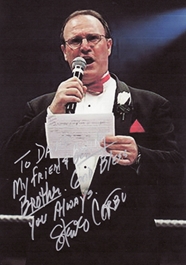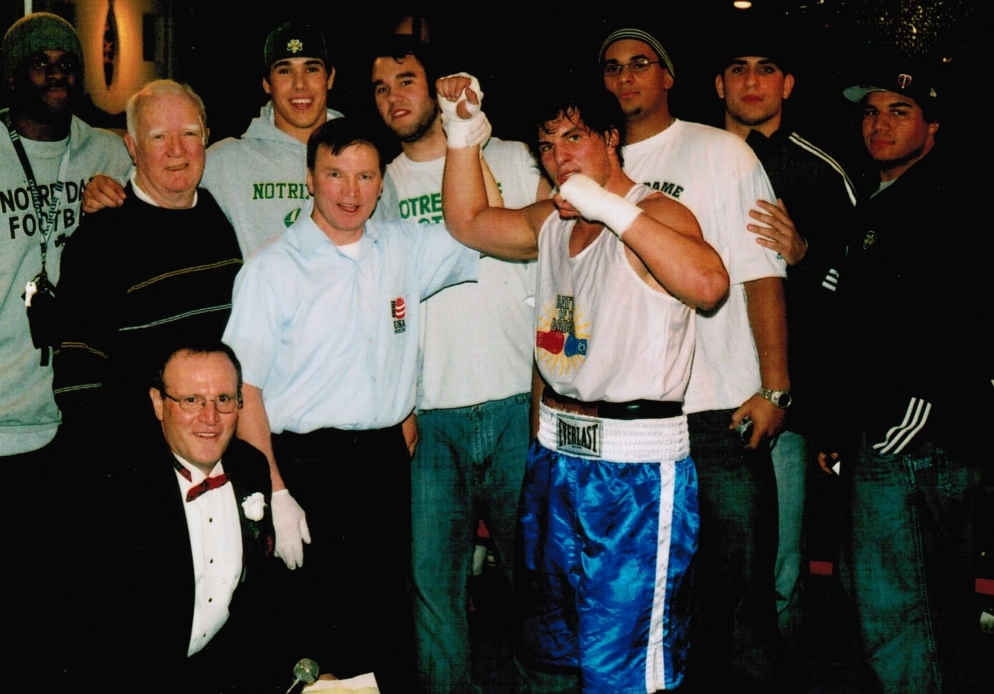*** FLASHBACK – this article originally appeared on dmboxing.com on January 5, 2013
By Steve Corbo
Author Steve Corbo (kneeling) with current NFL player Tommy Zbikowski and members of the University of Notre Dame Football Team, including NFL Quarterback Brady Quinn, after one of Zbikowski’s amateur bouts.
Like most of us I was dismayed by the performance of the Men’s US Olympic Boxing Team in London. Add to our Olympic debacle the AIBA problems with USA Boxing, and it gets downright discouraging. Even those of us who love the game have to admit, boxing in the United States, just isn’t what it used to be. And that is especially true in the heavier weight divisions.
To remind myself of what it used to be like I looked at a Ring Magazine from April 1980. “The Ring’s World Ratings” listed the top ten heavyweights in the world, nine (9) of whom were from the United States 다운로드.
Then I looked at Ring Magazine’s Ratings as of October 2012. Just like they did 32 years ago, they list the ten top heavyweights in the world. But in 2012, only one (1), Chris Areola, is from the United States. Even taking into consideration that Russian and Eastern European heavyweights didn’t turn pro 32 years ago, it is startling, in a division once dominated by the United States, we are so under represented.
This got me thinking about an article I just read about a high school football team gearing up for their shot at a fourth consecutive State Championship. Their coach talked about three players on his team. These “High School Kids” are 6’4” 290 pounds; 6’3” 255 pounds and 6’6” 260 pounds.
These aren’t just big kids, these are top athletes, highly motivated and focused on football. They are coached and trained by an experienced staff with a proven track record of success. All three are destined for Division 1 college football. That means USC, Michigan, Notre Dame, etc.
These kids have the ingredients; size, mental capacity, heart and physical talent to play at the very top level of college football 다운로드. These are the same basic ingredients necessary to be a successful heavyweight boxer. And Linemen, Defensive Ends and Linebackers are certainly no strangers to hitting and getting hit! So why are these athletes playing football instead of boxing? Could one of them be the next Louis, Ali or Marciano? What would boxing be like, in the United States, if we could attract this caliber of athlete?
I’m not talking about becoming boxers, after the football career washes out. Pro Boxing is littered with former High School and College football players, along with a few who had a “cup of coffee” in the NFL. And I am certainly not talking about sideshow antics like “Too Tall” Jones, Mark Gastineau or Baseball’s Jose Canseco 다운로드.
Why aren’t these young, top caliber, athletes making boxing their first choice and sport of preference?
There is no easy answer, but one thing is for certain. In the United States today, the deck is stacked against boxing from the very start. For the most part, athletically gifted young boys are conditioned, at a very early age, to be a part of what basically amounts to a pipeline for the NFL, MLB or NBA, the carrot being a free college education (what parent doesn’t want that for their child?). And, if they are good enough, a multi-million dollar pot of gold in the form of a pro contract, at the end of the rainbow.
The media machine that fuels the NFL, NBA and MLB starts stoking the fires at an early age! Pop Warner football players dream of playing in the Super Bowl html 서버 파일. The playground courts are filled with kids dreaming of becoming the next Kobe or Lebron. What little leaguer doesn’t want play in the World Series?
By the time these child athletes reach high school, they already know their dreams have a chance to become their realities. The next step, of course, is getting an opportunity to showcase their talent on the national collegiate level. What high school football player can say no to a University where your home field is the L.A. Coliseum (or its equivalent), where 100,000 people show up to watch you play and millions more will see you on TV?
A few years ago, here in Chicago we had Tommy Zbikowski, a pretty good boxer with a good amateur background. If he would have gone into boxing, full-time (he’s 4-0 as a pro in between playing in the NFL), in a few short years he probably would have become a world rated cruiserweight, with a real shot at becoming a World Champion. But he went to the NFL instead.
Who can blame a young athlete for making that choice? Today, NFL and MLB signing bonuses run into the millions of dollars. That’s just the signing bonus; you still get paid a salary on top of that! And if you stick around long enough… there’s that pension! Don’t forget about the free college education you can pick up along the way! In Tommy Z’s case it was at Notre Dame.
And there is another factor to consider, especially here in the United States. While the NFL, NBA and MLB were becoming the glamour sports, much of the glamour once associated with professional boxing was leaving the sport.
There was a time when the champion of the world was THE CHAMPION OF THE WORLD, known and universally recognized by all. But in today’s murky waters of multiple sanctioning bodies, each with their own rankings, with their own Champions, along with “Regular” World Champions, “Super” World Champions, “Diamond” World Champions, “Silver” World Champions, “Interim” World Champions and 17 different weight divisions… Being a champ “just ain’t what it used to be!”
Putting glamour and a college education aside, every young, blue chip, athlete has to ask himself “in what sport do I have the best chance to make the most amount of money, for the longest period of time?” Unfortunately the answer to that question isn’t pro boxing.
According to the Major League Baseball Player’s Association, the average MLB player’s salary, in 2011, was nearly $3.1 Million(1). In the NBA it was 5.15 Million and the NFL’s average salary was $1.9 Million(2). While most professional boxers still ply their trade in relative obscurity, in front of small crowds, and earn far less than $1 Million over the course of their entire careers.
Even worse, in 2012, most professional boxers still have to simultaneously work other jobs in order to survive. That just doesn’t happen to NFL, NBA and MLB payers!
Also, when it comes to professional athletes and money, it’s not just about what they make for performing as an athlete that one has to consider. It’s also the potential for endorsement deals which can last long after their playing days are over. Off the field earnings can be a major part of their overall income and ultimately their lifestyle.
In 2012 Forbes Magazine lists Floyd Mayweather, Jr. and Manny Pacquiao as #’s 1 and 2 on their list of the world’s 100 highest paid athletes. But in 2011 Mayweather’s income from endorsements was ZERO and Pacquiao’s was $6 Million. While Lebron James, Kobe Bryant and Payton Manning earned $40 Million, $32 Million and $10 Million respectively, just on endorsement deals. Just in one year! Let’s also mention Tiger Woods, who even with all his personal problems played out in the tabloids, still managed to earn $55 Million last year… in endorsement deals alone( (3).
Staggering as their earnings may be, even boxing’s most successful, talented and highest paid athletes aren’t making what their contemporaries are in other sports, over the course of their careers. And when it comes to what the average professional boxer earns over the course of their career… their earnings are embarrassingly low compared to what they’d make as commensurate athletes in the NFL, NBA or MLB.
Of course there are many other factors that have led boxing, in the United States, to its present condition. But to turn the sport around in this country, boxing needs to be able to compete with the glamour, the prestige, a free college education, major network TV exposure and ultimately the money offered by other professional sports! We need to have more 9 year olds dreaming about becoming Heavyweight Champion of the World! And that’s something I just don’t see a lot of today in the United States!
There will always be boxing and the general public will always have an interest in the latest “fight of the century”. That means boxing will always have one or two mega money makers like Mayweather and Pacquiao. But for everybody else… the money just isn’t in boxing, compared to what it is in other sports.
Unless boxing can offer young, blue chip, athletes something on a par with a career path to the NFL, NBA or MLB, fans in the United States better get used to seeing the best athletic talent in this country (especially in the heavier weight classes) opting to perform in other sports. And at the same time they can watch athletes and promoters from around the world, who don’t have to compete with the NFL, NBA and MLB for talent, continue to take the reigns, once the exclusive domain of the United States, and drive boxing into the 21st century.
(1) http://espn.go.com/mlb/story/_/id/7319810/major-league-baseball-average-salary-increases-31-million
*************************************************************************************************************************************************************************
With more than 30 years in the boxing game, Steve Corbo has worked with professional boxers in a variety of capacities including managing, training and booking agent; while also trying his hand at promoting, matchmaking and public relations! His first taste of boxing on the international scene was in 1980 when he traveled to London, England with a fighter he was handling, who fought on the undercard of the Marvin Hagler – Alan Minter World Middleweight Title Fight.Since then professional boxing has taken him to every continent in the world, except Antarctica.
He was co-host and color commentator for the TV Series, “Saturday Night At The Fights”, televised weekly in the Chicago market. He was color commentator on the Emmy Nominated broadcast of the Chicago Golden Gloves Tournament. He was the Chicago Area Correspondent for Boxing Digest Magazine and over the years has written articles, on boxing, which have been published in various periodicals.
As an amateur boxing official, including a stint as Chief Judge of The Chicago Golden Gloves Tournament, he developed and taught the first “Judge’s Seminar” required for all judges participating in the tournament. This lead to his selection to be a professional boxing judge.
When a regular ring announcer pulled out of a show at the last minute, and the promoter couldn’t find a replacement, Corbo (who was scheduled to be a judge on that show) agreed to hop into the ring and a new career was born. Over the past several years he has made his mark as a top boxing ring announcer, especially in Europe, where he has announced major WBC WBA, IBF and WBO World Championship Title Bouts which have been televised around the world.
He is perhaps the only person to have ever been a judge in a Championship Title Bout and also a Ring Announcer in a Championship Title Bout. On occasion he has even been heard at Chicago’s world famous United Center where he auditioned for, and was hired by, the Chicago Blackhawks NHL Hockey Team to be their backup PA Announcer.

I wish the money was more evenly dispersed in pro boxing than it is. It is way to top heavy.